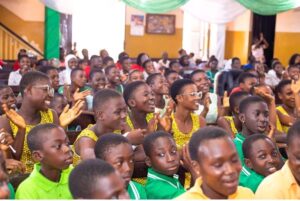By Juliet Aguiar DUGBARTEY, Apowa
Yinson Ghana, in partnership with the Ahanta West Municipal Directorate of Education, has held its second annual training on period-poverty to address critical issues that affect countless women and girls during menstruation.
500 students from five circuits within the municipality each received two packs of sanitary pads, an improvement over the previous year.
They were taken through topics such menstrual hygiene practices and management; different types of sanitary pads and how they can be fixed properly, ensuring good personal hygiene during the period; as well as the importance of breaking taboos surrounding menstruation among others.

This is aimed at tackling challenges associated with menstruation, and the mission is among others to combat period-poverty head-on and empower young women to stay focused on their education.
Also, an educational drama was used to create understanding on menstruation.
Edward Mensah, Corporate Social Responsibility Coordinator of Yinson Ghana, explained that “period poverty is not just a local issue, it’s a global concern. Women, often face discrimination and ill-treatment due to this natural biological process”.
He pointed out that in societies with extreme poverty and entrenched negative cultural beliefs, the situation worsens. Many women lack access to essential products such as sanitary pads, making it difficult for them to maintain proper hygiene during menstruation.
He observed that this causes gender inequity and adversely affects women’s well-being, saying: “We can break down barriers, empower our girls and create a more equitable future. Let us be committed and continue to champion the rights and dignity of every woman and girl in our community.”
The Ahanta West Municipal Director of Education, George Effah, in an address read for him said the theme for this year, ‘Together for a Period-Friendly Ghana, resonates deeply with the collective efforts required to create an environment where menstrual health is prioritised and menstrual hygiene is accessible to all.
This theme, he said, serves as a call to action – urging all to unite in commitment to ensuring that no schoolgirl is held back due to a natural biological process.
“Menstrual hygiene is not just a matter of health; it is a matter of dignity and human rights. Too often, schoolgirls face stigmatisation, discrimination and barriers to education as well as participation in daily activities simply because of menstruation. This must change and it begins with us, here and now,” he said.
“When girls and women have access to safe and affordable sanitary materials to manage their menstruation, they decrease their risk of infection. This can have cascading effects on overall sexual and reproductive health, including reducing teen pregnancy and improved maternal outcomes and fertility,” he said.

He called on stakeholders to continue with policies that support menstrual health education in schools, ensure access to affordable menstrual products and dismantle the stigma surrounding menstruation.
“Together, we can build a Ghana where every girl and woman can thrive, regardless of their menstrual status,” he said, expressing gratitude to Yinson Ghana for their generosity and thoughtfulness.
Madam Irene Dela Amedekah pointed out that menstrual hygiene management is not merely a health issue, it is a matter of dignity, equality and human rights. Yet millions of women and girls around the world face barriers in accessing adequate menstrual hygiene products, facilities and education.
“We must break the silence and stigma surrounding menstruation. It’s time to ensure that every woman and girl has access to safe and hygienic menstrual products, proper sanitation facilities and comprehensive education about menstrual health,” she said.
She noted that lack of information about menstruation leads to unhygienic and unhealthy menstrual practices, and creates misconceptions and negative attitudes. It is only education that can help improve menstrual hygiene.
“By addressing menstrual health hygiene comprehensively, we can empower women and girls to manage their periods with dignity, stay healthy and fulfil their potential. Let us work together to create a world where menstruation is no longer a barrier to equity and dignity.”
Representatives from the Ghana Health Service, Mrs. Evelyn Mensah and Madam Portia Assan, took the students through how to observe hygiene properly during menstruation; such as changing sanitary pads every four hours, washing hands to prevent bacteria and infections among others.
Nana Afolliba II, Queen Mother of Apowa, commended Yinson Ghana for supporting students and communities in their operational area.










